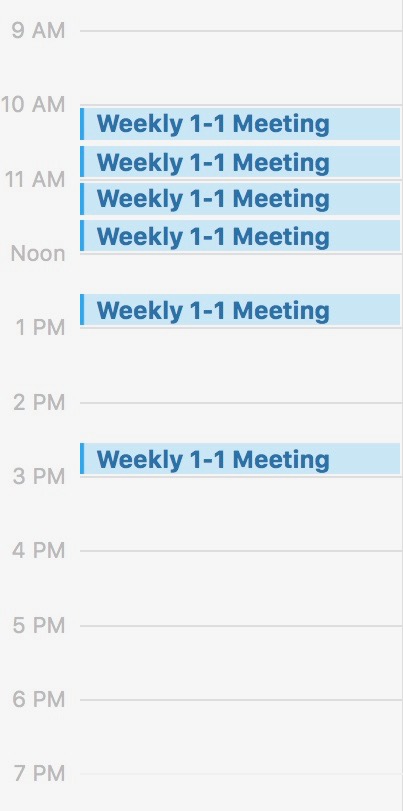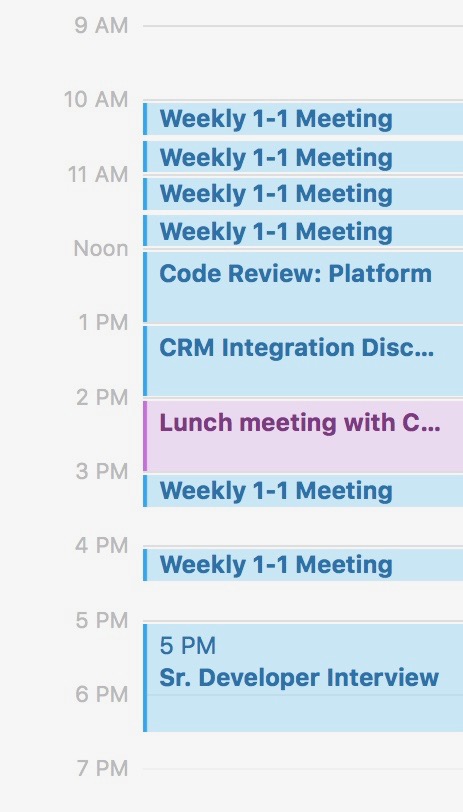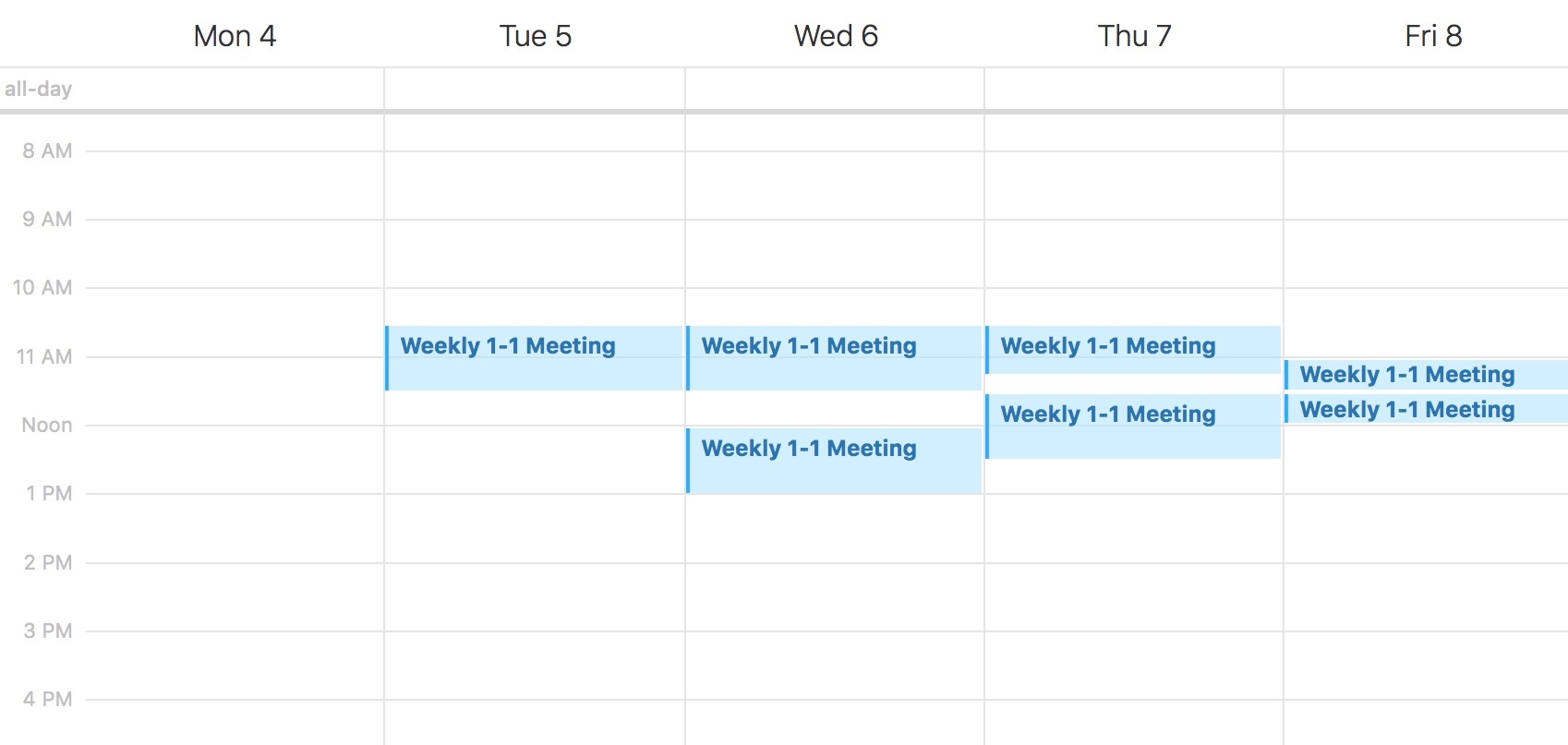Changing my calendar for better 1-1s
One of my biggest learnings related to time management, is to take time to review how I am spending my time. I did this recently to improve how I was organizing my calendar, specifically as it related to my weekly 1-1 meetings with my direct reports.
Let’s begin at the beginning.
TL;DR
- As your responsibilities change, your calendar will need to change with it.
- Take the opportunity to self reflect and measure your own performance. Don’t be afraid to be critical of yourself.
- Your management techniques will have to grow as your responsibilities grow. For example, what works when you are managing a team of 2-3, will not work when you manage a team of 10.
- Do not overbook yourself, it is OK to say “no”.
- Avoid back to back 1-1 meetings.
- Focus on your people.
Beginning at the beginning
When I first began having weekly meetings, I booked my first 1-1 on a Friday at 11:30am. I chose Friday because as the last day of the week, it felt like the perfect point to recap. To catchup. To discuss the previous week and look forward to the next. I chose 11:30am as most engineers (myself included) are not morning people.
As the prototype proved successful, I setup my second 1-1 on Friday as well. Then my third.
As I began to manage more and more people, I continued to carve out more time on Fridays to conduct my meetings. As this was the early years of my 1-1s, the agendas primarily focused on task prioritization.
So ok, that’s Friday, but how did the rest of my week look? My weeks were typically split between “meeting” days and “development” days. Monday, Wednesday, and Friday were meeting days, Tuesday and Thursday (the even days) were development days (i.e. when I got “even” with code :P). At my company, Mondays are meeting days (staff meetings, standups, etc.) and Wednesdays evolved into a meeting day due to standing client calls. That left Tuesday, Thursday, and Friday “open”.
My schedule originally evolved from the need to have dedicated development days as the organization focused on building a new version of our Platform, of which I was the tech lead.
Looking back, I would say my weeks were (roughly):
- 50% programming + R&D
- 40% meetings (stand-ups, 1-1s, clients, management, etc)
- 10% strategic planning
This schedule worked for a while and had many benefits:
- I knew going into each day what the general focus was
- Team members had a clear sense of what my meeting and development days were
- It gave me full days to dive right into code
However, as the team grew and my responsibilities expanded, this setup did not scale.
As your responsibilities change, your calendar will need to change with it. It will have to grow and evolve to fit your new role. This will happen multiple times throughout your career and you have to be open to it. What worked to get your here, will not work to get you there.
This is working…wait, is this working?
Over time, this setup began to show a few cracks and eventually crumbled.
How so?
Well, what happens if when there are client calls on a Tuesday? What happens if when Monday is a holiday? What if there is an issue from a release on Wednesday that we need to discuss on Thursday? I cannot push this to Friday, its urgent, we need to discuss. So no coding on Thursday, and I can’t push to Fridays. What if code review is needed on Wednesday or if someone is absent and needs to reschedule a meeting. What if the development needs more than just one day to complete (it will).
Worst of all, was that I was started to get burned out. My Fridays began to overwhelm me. Some Fridays would have as many as 8 to 10 meetings, with the majority of these being 1-1s. As my team grew I was trying to squeeze more and more 1-1s on Friday.
The worst thing to do in a 1-1 meeting is to not be 100% present.
My Fridays would sometimes have five 1-1s back to back, with no breaks in between. Sometimes the meetings would run over and then I would need to push back meetings and it would cascade, pushing back other meetings throughout the day. I can only imagine how frustrating this might have been for my direct reports. Additionally, as vacations and PTOs frequently fall on Fridays, 1-1s would have to be rescheduled throughout the week.
A Friday might look like this:

And sometimes looked like this:

When most of my responsibility revolved around managing two to three developers and hands on programming, software was prioritized. As more of my day to day development was delegated and I started overseeing a larger team, my focus shifted to the people and how to put them in the best positions to succeed.
As your responsibilities change, your calendar will need to change with it. It will have to grow and evolve to fit your new role. This will happen multiple times throughout your career and you have to be open to it. What worked to get your here, will not work to get you there. I was witnessing this firsthand and needed to make a change.
Time to change it up
What worked when I managed two to three people, did not work for five. Five did not work for 15. Managing a team of individual contributors is different from managing a team of both individual contributors and managers. The junior developers had now grown to senior developers and tech leads. I started managing managers and overseeing all of technology, not just one aspect of it.
I realized that programming no longer was the most important part of my role. In fact, the more I focused on code, the more it hurt the team. I could no longer revolve my schedule around “getting even with code”. Once again I had to let go, evolve further and focus on what is most important. The people.
The worst thing to do in a 1-1 meeting is to not be 100% present. Sure, physically you may be there, but if you are not there mentally its bad for everyone. The person you are meeting with can tell you aren’t really present. What if they have something really important to bring up? What if they were feeling that this position wasn’t for them, wanted to talk about it, and on that day you were just not “there”.
And I know, we are all human. Managers, leaders, we get worn down too, we have bad days. However, if I have a bad day it can cascade and ripple down into my direct reports.
Well, I had to minimize this impact. I had to reduce (if not fully remove) these days. So what did I do.
I completely changed my schedule (gasp).
This process of change had a few steps:
- Internal reflection followed by ripping up my calendar and sketching out a new one
- Speaking candidly with my team. In each 1-1, I opened up. I told them how I was shifting my schedule to better focus on being “present” in these meetings.
- This is a huge point, honesty goes a long way. I feel it helped strengthen bonds as it allowed my humanity to come across. I am not a robot, not perfect. It also showed how it is ok to admit shortcomings, change, and commit to doing better.
- I asked them what times worked and did not work for them and scheduled meetings accordingly
- I opened up my calendar and began having 1-1 meetings throughout the week (yep, including Tuesdays and Thursdays).
The Modern Age
As my responsibilities grew and I oversaw more departments and teams, more time was needed for both 1-1 meetings and planning.
During this time, I would say my weeks were (roughly):
- 50% meetings (1-1s, clients, vendors, HR/admin, stand-ups, conferences, etc)
- 30% strategic planning (employee career growth, technology vision, company growth, etc.)
- 20% R&D (including code review)
The benefits of this new schedule:
- Less back to back 1-1 meetings (down from 5 to 1)
- More time for 1-1 meetings (some meetings needed more time/consistently went over the time, so I scheduled accordingly)
- Reduced feelings of burnout
- More productive 1-1 meetings
- More balanced schedule
- More time spent on vision and strategic planning to help move the company forward.
So what does the new calendar look like?
(Note: only 1-1 meetings shown)

Key learnings and personal insight
- Do not overbook yourself. You are human and need mental breaks too.
- Reflect on your calendar, is your current schedule working for you? Do you find yourself exhausted, frustrated, or dreading certain days? Take a step back and analyze those feelings, what can you do to address this? Can you shift meetings to other days
- Avoid afternoon meetings
- Do not schedule back to back 1-1 meetings, sometimes they rollover. Also, sometimes important issues may arise towards the end of the time and you do not want to feel the pressure of the clock
- As your role changes, the way you spend your time must change as well.
- Make sure you are being present for your people. Be your best in every 1-1 meeting you are in.
- to do this, make sure you are mentally rested
- do not schedule too many 1-1 meetings in a day (my current rule is no more than three in one day)
Conclusion
Time management is hard. It is a skill that’s required in every phase of your career. I have witnessed firsthand that time management has become more and more critical at each step in the ladder as I’ve progressed from developer, to tech lead, to director, to VP. I wish I could tell you that it gets easier over time. But, here’s the good news. As you gain experience you will more readily find areas of your time (day/week/etc.) that you can better manage and organize, which will ultimately help you become more effective in your role as a leader.
